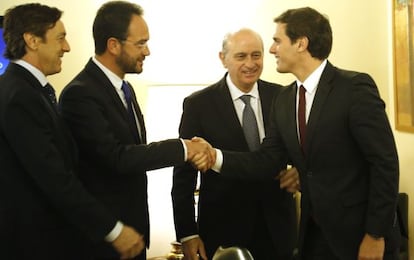Spain expands anti-jihadism pact to main opposition parties
But show of unity marred by absences of PP and Socialist leaders and Catalan nationalists Emerging left-wing Podemos attends as “observer” but fails to sign up

The Spanish government and several opposition groups signed an anti-terrorist pact on Thursday aimed at improving the fight against global jihadism.
But the desired show of unity was compromised by the conspicuous absence of the heads of Spain’s two main parties, the ruling Popular Party (PP) and the Socialists.
The more of us here at the table, the better. Like the pact says, our strength resides in the law and in unity” Interior Minister Jorge Fernández Díaz
Smaller regional parties such as the Basque Nationalist Party (PNV) and the Democratic Convergence of Catalonia (CDC), as well as the United Left coalition, also failed to show up, while emerging left-wing group Podemos went merely as an “observer” but did not sign the document.
Podemos representative Rafael Mayoral said his party would not join the pact because it was “not a useful tool” against so-called Islamic State (ISIS).
“It’s logical for all countries to unite because we are all under threat, and it didn’t make sense not to achieve unity at the national level,” said Interior Minister Jorge Fernández Díaz. “The more of us here at the table, the better. Like the pact says, our strength resides in the law and in unity.”
But the absence of Prime Minister Mariano Rajoy and Pedro Sánchez distracted from the solemnity of the event, particularly since it was these two leaders who created the anti-terrorist pact in the first place, shortly after the jihadist attacks on the French satirical publication Charlie Hebdo.
Their absences were explained with the argument that the meeting was just a follow-up to the February signing ceremony. Instead, both men were busy with their campaign events in the run-up to the December 20 general election.
“It’s up to each person to decide their priorities,” said Albert Rivera, the head of Ciudadanos, who did attend the Madrid gathering. “I’ve canceled a rally in Cantabria and another one in Asturias because I believe that we are doing something good for Spain. We need to think more about Spain than about the election.”
Besides Ciudadanos, which stands a good chance of winning a significant share of votes at the election, the other parties that added their signature to the pact were the smaller Union, Progress and Democracy, the Navarrese People’s Union, the Aragonese Party (PAR), Foro Asturias and the Canaries Coalition.
The event, which was held at the Interior Ministry, illustrated the political tension ahead of the December 20 vote, where the ruling PP is expected to lose its absolute majority.
The disunity also created a contrast with the situation elsewhere in Europe, where France, Germany, Italy, Belgium and Britain are busy forging closer ties to respond to the Paris attacks of two weeks ago.
Spain has yet to produce a specific proposal as to how it plans to help combat global jihadism, despite being on a level four alert for terrorist attacks on Spanish soil, one notch below the maximum of five. Spanish law enforcement has arrested more jihadists than any other country in Europe this year.
English version by Susana Urra.
Tu suscripción se está usando en otro dispositivo
¿Quieres añadir otro usuario a tu suscripción?
Si continúas leyendo en este dispositivo, no se podrá leer en el otro.
FlechaTu suscripción se está usando en otro dispositivo y solo puedes acceder a EL PAÍS desde un dispositivo a la vez.
Si quieres compartir tu cuenta, cambia tu suscripción a la modalidad Premium, así podrás añadir otro usuario. Cada uno accederá con su propia cuenta de email, lo que os permitirá personalizar vuestra experiencia en EL PAÍS.
¿Tienes una suscripción de empresa? Accede aquí para contratar más cuentas.
En el caso de no saber quién está usando tu cuenta, te recomendamos cambiar tu contraseña aquí.
Si decides continuar compartiendo tu cuenta, este mensaje se mostrará en tu dispositivo y en el de la otra persona que está usando tu cuenta de forma indefinida, afectando a tu experiencia de lectura. Puedes consultar aquí los términos y condiciones de la suscripción digital.








































